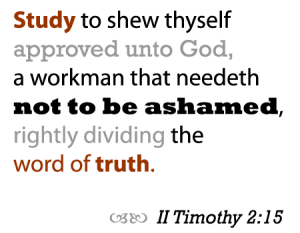The question is grounded in doubt. It would be understandable from a lost man who has not read much or any of the Bible, and we should gladly show him what the Bible says about Jesus. The same question from a professing “Christian” makes us wonder who he has listened to or what he has been reading. One thing is sure: the only people in the Bible who ever question the righteousness of Christ are unbelievers or those who “know not the scripture.”
Some who teach that the Lord Jesus Christ could have sinned, mean well in their effort to have Him identified with sinners. But good intentions do not always teach good Bible doctrine. Rather than accept His Whole Person, this idea separates the two Natures (Deity + Humanity) and diminishes His Person by treating His Humanity as though His Humanity could act apart from His Deity. That effort to magnify His Humanity at the expense of His Deity, actually separates the One Person and diminishes the efficacy of His perfect life and sacrificial death as the Perfect Substitute.
1. In the Old Testament types, the sin sacrifice was to be (as much as possible) without blemish. There was to be no offering of the blind, lame, or that with some doubt as to its value. The best was the accepted one. All OT types of Christ, His life and work, only point to His absolute perfection. To hold that the Humanity of Christ could have sinned, at the very onset makes one look for a blemish. We read “God was manifest in the flesh” but then treat Him as an OT TYPE RATHER THAN THE ANTITYPE, is a skeptical, unbelieving approach and potentially lowers His Human Nature to that same possible fault of an OT lamb or ox.
2. There is no efficacy in a death by someone on some cross. There were many crucified by Rome and two thieves were crucified on crosses at Calvary. It was not the cross that saved, it was the Person on the cross. We do not preach a crucifixion, we preach CHRIST crucified; the sinless Person on one cross made that particular death meaningful. We should never place the inanimate wood into a golden idol; the impeccable PERSON made that place memorable, the instruments and location were secondary to the Prince of Glory!
3. Scripture exalts the perfection of Christ in all aspects. Infidels lower the Person of Christ to make Him a mere man. We do not deny His Humanity but we must not forget that In His life and atoning death, His Deity cannot be diminished at the expense of His flesh, He was God manifest in the flesh, He was not just “a good” or even “great man” or a “possible sinner”.
The following verses prove that The Lord Jesus Christ could not and did not sin.
Consider these statements by Jesus in His prayer to the Father. At the appropriate place we will add comment relative to this study. To avoid loss of context, several verses are quoted although the entire prayer is testimony to His Person: God in the flesh.
JOHN 15
“1 THESE words spake Jesus, and lifted up his eyes to heaven, and said, Father, the hour is come; glorify thy Son, that thy Son also may glorify thee:
2 As thou hast given him power over all flesh, that he should give eternal life to as many as thou hast given him.”
“…power over all flesh” is certainly an amazing statement. If He had “power” over all flesh this not only meant others but His own. Some may argue that “authority” is meant here but the conclusion must be the same,
“3 And this is life eternal, that they might know thee the only true God, and Jesus Christ, whom thou hast sent.
4 I have glorified thee on the earth: I have finished the work which thou gavest me to do.”
In this statement (v3) the Lord equates Himself with the Father–no ordinary mortal who could sin would place himself in such a position. In v.4 He has “glorified” His Father and “finished” the work He gave Him to do. To say that at any moment He could have sinned would make Jesus a questionable Savior from the beginning, the rest of His life on earth a possible failure, and His very words “I have finished” not those of Eternal Deity—beyond the past, present, and future tenses–but one of the doubtful future, “I may finish the work between now and my death”. Compare Jesus’ statement to questions as to who He claimed to be: “before Abraham was, I am.”
“5 And now, O Father, glorify thou me with thine own self with the glory which I had with thee before the world was.”
This is not a speech by only His Deity–that is impossible–His Person is going to the cross, both God and Man inseparable in the incarnation, an event unparalleled by any mortal reason or thought.)
“6 I have manifested thy name unto the men which thou gavest me out of the world: thine they were, and thou gavest them me; and they have kept thy word.
7 Now they have known that all things whatsoever thou hast given me are of thee.”
God’s name has been “manifested” and “all things known”, not by them reading the OT or by a mere speech; all was done by His impeccable life before them–which means by contextual definition–that Jesus could not sin and leave an ungodly example in any aspect of His Being.
“10 If ye keep my commandments, ye shall abide in my love; even as I have kept my Father’s commandments, and abide in his love.” (John 14:10)
There is no question as to Jesus’ past and future sinlessness in this statement: “I have kept” (past) and “abide in his love.” ( now, continually) To all men who can possibly sin, the conditional “IF” always exists. For a person who could sin, the statement “I have kept and I abide” is presumptuous.
“30 Hereafter I will not talk much with you: for the prince of this world cometh, and hath nothing in me.” (John 14:30)
The devil had no place, power, influence or potential in the Person of Christ –that includes His Humanity.
“29 And he that sent me is with me: the Father hath not left me alone; for I do always those things that please him.” (John 8:29)
If Jesus COULD have sinned, His statement should have been, as ours must be: “I hope I can do always those things that please Him.”

